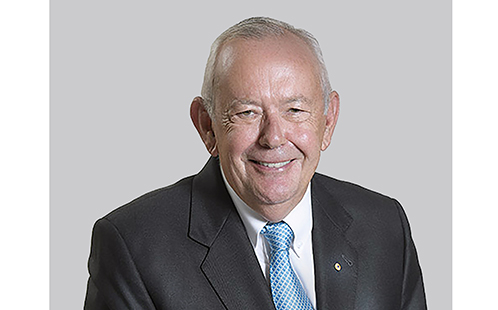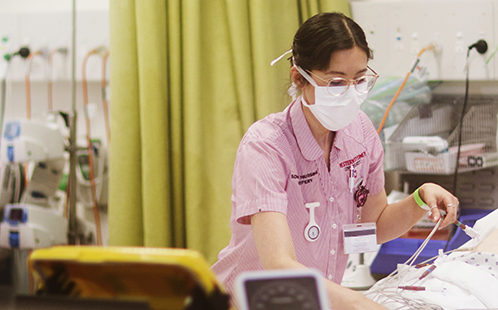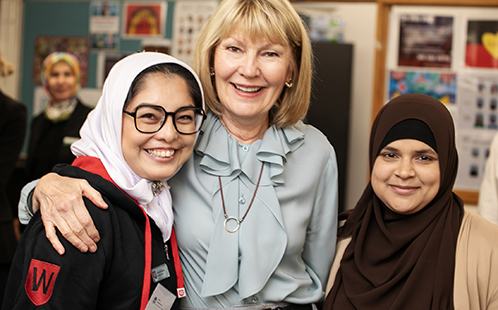Opinion: A stunning achievement: Western Sydney University's global No. 1 sustainability ranking
The following opinion piece by Professor Jennifer Westacott, Chancellor, Western Sydney University and Chief Executive, Business Council of Australia, was first published with full links on The Australian Financial Review(opens in a new window) (login required).
Universities gravitate towards challenges. They are largely defined by their capacity to problem-solve. They do so for intellectual and ethical motivations and, crucially, they do it for the long-standing foundational purpose of social good.
There are few bigger challenges than the quest for sustainable solutions to global development. Particularly in the face of climate change and growing inequity. The economic, social, cultural and very human implications are impossible to ignore. That is why it is a defining moment for Australia to have one of its own institutions recognised as the world’s best at this vitally important task.
Western Sydney University’s Parramatta Innovation Engineering Hub – Hassall Street campus. WSU has been named the world’s best university for ESG for the second year in a row. Sally Tsoutas
I am fortunate to be the chancellor of Western Sydney University, which for the second year running has been ranked No. 1 in the world in the Times Higher Education 2023 impact rankings for its commitment to the United Nations’ 17 Sustainable Development Goals. This is the leading universities rankings framework, in which thousands of institutions compete in the interests of excellence and improvement.
Think of any one of the world’s leading, most acclaimed universities. Now think again, and look to Western Sydney.
With all humility, this is a stunning achievement. It defines Western Sydney, a region eschewing labels of disadvantage, as instead a place where paths to ethical, inclusive and sustainable international advantage can be mapped.
There is much to be learned from a region that can achieve that level of recognition. In many ways, that’s why Western Sydney University continues to succeed in this key area.
Ours is a university inseparable from our region. How could a university in one of the world’s most culturally diverse, rapidly growing and dynamic regions be anything but connected to its community? That is a sustainable relationship, a symbiosis in practice in every sense of the word.
That connection is reflected in the UN goals in which Western Sydney University particularly excelled, specifically: in addressing gender equality and our research and approach to the sustainable use of resources. These challenges are inherent to a region where the environmental impacts of rapid development and the inequities of gender imbalance must be addressed collectively for communities to thrive.
Collaboration is the secret to success
This is a setting – in western Sydney – where issues like urban heat load and women’s participation, paid and unpaid, in the economy are both immediate, theoretical and practical challenges, not just for a university, but for government, the community and industry. Collaboration is unambiguously the secret to Western Sydney University’s success.
Recognising the centrality of a partnered approach to sustainable development draws me toward the possibilities of even more intensive and purposeful collaboration with industry. In recognising the committed efforts of my predecessor as chancellor, Professor Peter Shergold, in marshalling the energies of government and community to the cause of sustainability, I am convinced that the business community can drive continued success in this area.
As chief executive of the Business Council of Australia, I have seen how Australian businesses have thoroughly outpaced energy policy. I have witnessed innovations in clean energy, resource management and in gender equity that eclipse global competitors, exceed political will and, rightly, raise community expectations.
In my leadership role at the Western Parkland City Authority I have seen too how the development of Australia’s newest city, Bradfield, alongside what will be the country’s most technologically advanced airport, is transforming city-shaping. The sustainability of the energy, water, digital, transport and built infrastructure at the site will be second to none. This will be Australia’s sustainable infrastructure centrepiece.
The current Universities Accord reforms under development, federally, are an opportunity to bring these aligned but all-too-often separate streams together.
Education Minister Jason Clare has placed equity at the heart of this push for change. That’s not surprising for a parliamentarian from western Sydney. But it shouldn’t be mistaken for a social agenda alone. It is clear the minister expects, as do industry and community leaders, the coming reforms to enable greater collaboration in areas of common challenge and opportunity. It is hard to see anything in that context that rivals the importance of sustainability.
The scene is set. The path to continued success globally in sustainability is unfolding in Sydney’s west. The world sees that. A region once written off domestically as a social and economic problem, an issue for governments to solve, and a place where only bad news made headlines is now our greatest internationally facing asset.
A No. 1 ranking in sustainability won’t make the front page. That is not why my university or, I’m sure, my business and community colleagues are committed to it. We must be the best at addressing these challenges because the people we serve demand it. They expect nothing less, and I am committed to ensuring we don’t let them down.
ENDS
5 June 2023
Latest News

Western Sydney University receives transformational donation to support LGBTIQA+ community
Western Sydney University has welcomed a philanthropic donation from The Brennan Lynch Foundation.

Western Sydney University ranks among world’s best for 23 subjects
The University has been named as one of the world’s top universities for the study of 23 subjects in the latest edition of the QS World University Rankings by Subject, including being ranked in the top 50 for Nursing.

Western Sydney University receives landmark $7.9 million philanthropic gift from Harvey Norman to launch leadership academy, empowering young women in Western Sydney
Western has welcomed a landmark donation to establish the Harvey Norman® Young Women’s Leadership Academy Led by Katie Page.
Mobile options:

